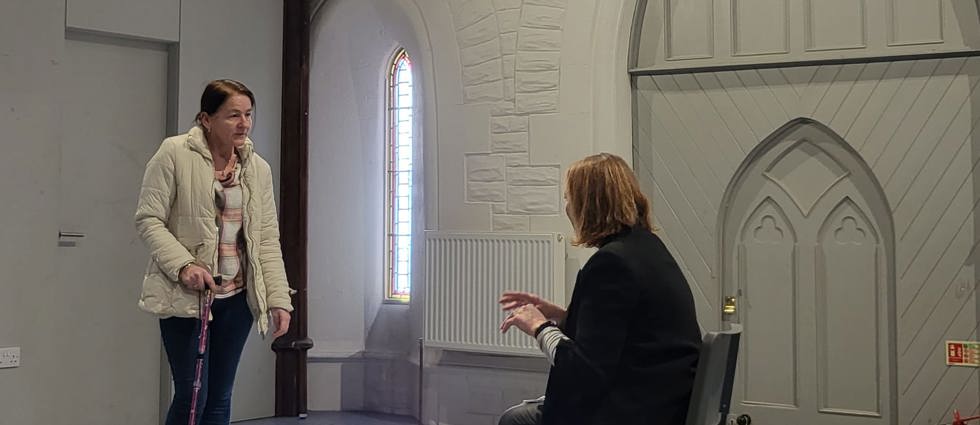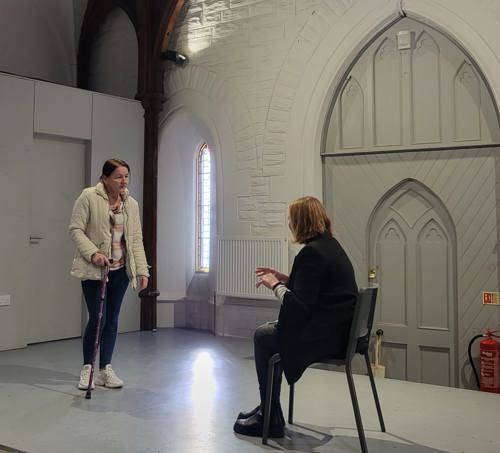
Judged
MECOPP’s forum theatre performance highlighted different ways in which mental health stigma and discrimination is experienced in the Gypsy/Traveller community.
Minority and Ethnic Carers of People Project (MECOPP) works to ensure carers from different marginalised groups have access to services that protect their quality of life.
As part of the Anti-Stigma Arts Fund, they hosted a forum theatre event in Edinburgh at the beginning of March. Forum theatre is a type of theatre that asks the audience to influence the performance on stage. The production involved members of the Gypsy/Traveller community working with an actor on stage to tell a story while encouraging the audience to join in and explore different options to solve the problem.
All of the scenarios centred around the challenges Gypsy/Travellers face in society and how it impacts their mental health.

Project co-lead Donna Lawrie said: “The Gypsy/Traveller community has got quite a strong oral culture and tradition – there's storytelling and songs.
“It's never really been a community, that I know of, of writing things down. So, it really suited the community we've worked with. Seeing people face to face, that’s where the community best operates.
“They found this easier to do than having to write down all their experiences. It comes more naturally, and it's very powerful.”
Members of the audience watched three different scenarios play out, and each one exemplified the everyday struggles that impact and affect the mental health of those in the Gypsy/Traveller community.
The first scene centred around a woman who was being followed around a shop by a security guard, based on how she looked. The second highlighted the way people felt they were treated differently because of their home address when trying to register at their doctor’s surgery. It also touched on the literacy challenges and the lack of support.

Lastly, two nurses were sent out to a trailer of a parent whose daughter had cancer when she was younger. The nurses told the woman they couldn’t offer support because the accommodation she lived in was not considered “appropriate”.
At the end of each performance, the audience was invited to discuss what could have been done better – and people from the community contributed by relaying their own experiences.
Donna said: “They didn't all recognise at the start of the process how these experiences throughout their life, these small things that happen, just become daily acceptance.
“Community members in the audience would raise their hand and say, “You know, that happened to me as well,” and, “this happens a lot and it stops me from going to these kinds of places”.
“They talked about how their experiences of similar scenarios impacted on their mental health, and people that I didn’t think in a million years would speak up were talking.”

In the audience, around 30 people were from the Gypsy/Traveller community, and 20 were from a range of service providers such as NHS, Breathing Spaces and Police Scotland.
Donna added: “Instead of just watching something, or hearing about an experience, you're a part of trying to solve it.
“We write case studies, we write reports, but rather than just having that on your desk, [service providers] were in the situation, trying to solve it and feeling that emotion.”

Rhona Ramsay, who also led on the project, said the format was powerful and effective for illustrating the dual stigma this group faces.
She added: “That's what makes it very engaging for the audience as well because they are getting drawn into this quite frustrating situation that’s being put across [on stage].
“They're feeling frustrated and that's a great thing because they’re taking on some of those feelings. But they're also wanting to make that change.
“They can be confronted by the same frustration that the Gypsy/Travellers are saying that they're experiencing and that can be a new thing for people.
“It's amazing. These things are built purely on people's own stories. It's very real because that is at the heart of what it is we're doing. The focus is people's own personal experiences, and how they emotionally engage with those experiences.”
MECOPP hopes to continue using forum theatre as a way to raise awareness. As a result of Judged, an offshoot project around women and having their voices heard is being planned.
Tackling stigma through art

